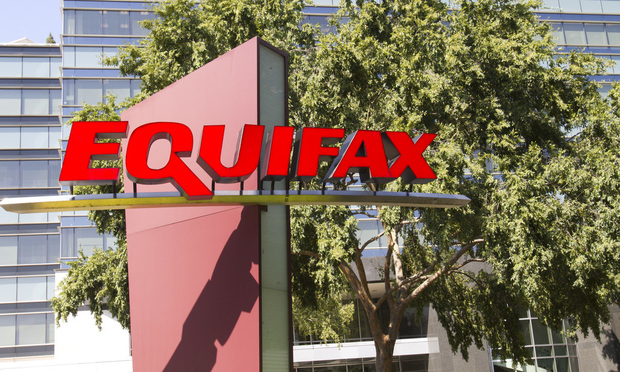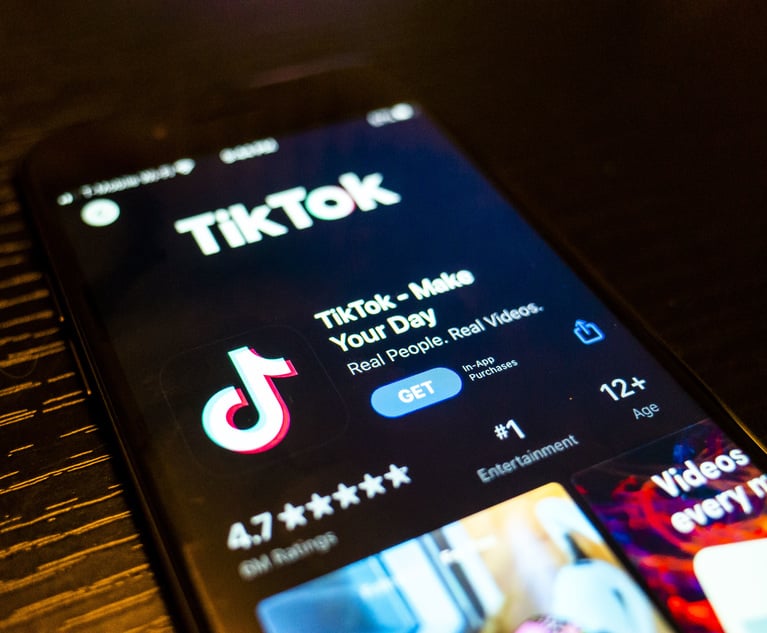Equifax Finds 2017 Hack Compromised Data of 2.4 Million More Consumers
Equifax on Thursday expanded the number of consumers whose financial data and personal information have been compromised to a breathtaking 148 million.
March 01, 2018 at 01:43 PM
3 minute read

Equifax on Thursday expanded for the second time its estimate of the number of consumers impacted by its 2017 massive data breach.
The Atlanta-based credit bureau announced that it has now confirmed the identities of an additional 2.4 million U.S. consumers whose names and partial driver's license information were stolen by hackers who penetrated Equifax's firewalls sometime last year.
The company also noted that its forensic experts had determined that the hackers were primarily focused on stealing Social Security numbers.
Equifax's new revelation brings the total of consumers potentially affected by the hack to 148 million.
Equifax did not discover the hack until July 2017 and did not notify the public until September of that year.
Equifax initially announced that 143 million consumers whose financial data and personal identifying information the credit bureau had stockpiled was potentially compromised. Equifax later increased that number to 145.5 million.
In a news release issued Thursday morning, Equifax said the additional compromised consumers were uncovered during a forensic examination of the company's databases. They were not included in the original population of those affected because Equifax data did not include consumers' home addresses and drivers' license information was incomplete.
“This is not about newly discovered stolen data,” Equifax interim CEO Paulino do Rego Barros Jr. said in a written statement included in the release. “It's about sifting through the previously identified stolen data, analyzing other information in our databases that was not taken by the attackers, and making connections that enabled us to identify additional individuals.”
Equifax said it intended to notify the newly identified consumers and will offer identity theft protection and credit monitoring services at no cost.
Equifax also claimed the company's' forensic experts had found “no evidence” that Equifax's core consumer, employment and income or commercial credit reporting databases were accessed by hackers.
Meanwhile, more than 300 proposed class action suits have been filed on behalf of individual consumers, financial institutions and businesses that may have been impacted by the data breach. Those suits have been consolidated in pending multidistrict litigation in U.S. District Court in Atlanta.
This content has been archived. It is available through our partners, LexisNexis® and Bloomberg Law.
To view this content, please continue to their sites.
Not a Lexis Subscriber?
Subscribe Now
Not a Bloomberg Law Subscriber?
Subscribe Now
NOT FOR REPRINT
© 2025 ALM Global, LLC, All Rights Reserved. Request academic re-use from www.copyright.com. All other uses, submit a request to [email protected]. For more information visit Asset & Logo Licensing.
You Might Like
View All
Bojangles Restaurant Chain Faces Several Lawsuits Following Data Breach

'Cradle to Grave': Children's Clothing Company Carter's Sued in Digital Privacy Class Action

Hall Booth Smith Experiences Data Breach—Here's What You Need to Know to Protect Your Firm's Data

Georgia Lawyers Speak at Conference Session Focusing on Rise of Collaboration Apps
4 minute readTrending Stories
- 1‘Blitzkrieg of Lawlessness’: Environmental Lawyers Decry EPA Spending Freeze
- 2Litera Acquires Workflow Management Provider Peppermint Technology
- 3'I Can't Do This': Judge Blocks $16M Alex Jones Settlement
- 4TikTok Opts Not to Take Section 230 Immunity Fight to U.S. Supreme Court
- 5Feasting, Pledging, and Wagering, Philly Attorneys Prepare for Super Bowl
Who Got The Work
J. Brugh Lower of Gibbons has entered an appearance for industrial equipment supplier Devco Corporation in a pending trademark infringement lawsuit. The suit, accusing the defendant of selling knock-off Graco products, was filed Dec. 18 in New Jersey District Court by Rivkin Radler on behalf of Graco Inc. and Graco Minnesota. The case, assigned to U.S. District Judge Zahid N. Quraishi, is 3:24-cv-11294, Graco Inc. et al v. Devco Corporation.
Who Got The Work
Rebecca Maller-Stein and Kent A. Yalowitz of Arnold & Porter Kaye Scholer have entered their appearances for Hanaco Venture Capital and its executives, Lior Prosor and David Frankel, in a pending securities lawsuit. The action, filed on Dec. 24 in New York Southern District Court by Zell, Aron & Co. on behalf of Goldeneye Advisors, accuses the defendants of negligently and fraudulently managing the plaintiff's $1 million investment. The case, assigned to U.S. District Judge Vernon S. Broderick, is 1:24-cv-09918, Goldeneye Advisors, LLC v. Hanaco Venture Capital, Ltd. et al.
Who Got The Work
Attorneys from A&O Shearman has stepped in as defense counsel for Toronto-Dominion Bank and other defendants in a pending securities class action. The suit, filed Dec. 11 in New York Southern District Court by Bleichmar Fonti & Auld, accuses the defendants of concealing the bank's 'pervasive' deficiencies in regards to its compliance with the Bank Secrecy Act and the quality of its anti-money laundering controls. The case, assigned to U.S. District Judge Arun Subramanian, is 1:24-cv-09445, Gonzalez v. The Toronto-Dominion Bank et al.
Who Got The Work
Crown Castle International, a Pennsylvania company providing shared communications infrastructure, has turned to Luke D. Wolf of Gordon Rees Scully Mansukhani to fend off a pending breach-of-contract lawsuit. The court action, filed Nov. 25 in Michigan Eastern District Court by Hooper Hathaway PC on behalf of The Town Residences LLC, accuses Crown Castle of failing to transfer approximately $30,000 in utility payments from T-Mobile in breach of a roof-top lease and assignment agreement. The case, assigned to U.S. District Judge Susan K. Declercq, is 2:24-cv-13131, The Town Residences LLC v. T-Mobile US, Inc. et al.
Who Got The Work
Wilfred P. Coronato and Daniel M. Schwartz of McCarter & English have stepped in as defense counsel to Electrolux Home Products Inc. in a pending product liability lawsuit. The court action, filed Nov. 26 in New York Eastern District Court by Poulos Lopiccolo PC and Nagel Rice LLP on behalf of David Stern, alleges that the defendant's refrigerators’ drawers and shelving repeatedly break and fall apart within months after purchase. The case, assigned to U.S. District Judge Joan M. Azrack, is 2:24-cv-08204, Stern v. Electrolux Home Products, Inc.
Featured Firms
Law Offices of Gary Martin Hays & Associates, P.C.
(470) 294-1674
Law Offices of Mark E. Salomone
(857) 444-6468
Smith & Hassler
(713) 739-1250






